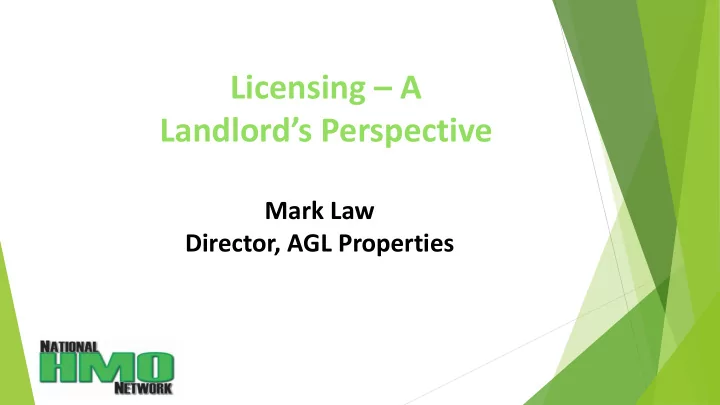

Licensing – A Landlord’s Perspective Mark Law Director, AGL Properties
Introduction I am a landlord with HMO properties containing bedsits I am a human being Increasing taxes and over regulation contribute to higher rents We need HMO properties to be affordable housing
Dealing with antisocial behaviour The authority a landlord has to tackle antisocial behaviour is only within their properties. Landlords and agents can only enforce a contract. They do not have powers to manage behaviour. House of Commons Library briefing paper Number 0264 24 February 2017: Tackling anti-social behaviour in social housing (England) House of Commons Library briefing paper Number 01012 27 February 2017: Anti-social neighbours living in private housing (England) Landlords can only address cases of serious antisocial behaviour by repossession
Dealing with antisocial behaviour (cont’d) Landlords wanting to keep their license are evicting tenants, even if there is no proven case Evicting tenants with no proof just moves the problem around and goes against the very principles of our legal system With the growing necessity of referencing, evicted tenants (fairly or unfairly) could find no private landlord will take them 4
Antisocial behaviour in social housing Social housing does have an obligation to manage antisocial housing Tenants evicted from social or private housing for antisocial behaviour can be deemed as having made themselves intentionally homeless and therefore the council may refuse to help rehouse them Antisocial tenants end up in the private rental sector where landlords have no powers to manage their behaviour 5
Antisocial behaviour and licensing Clarification is needed of council’s policy to help licensed landlords deal with antisocial behaviour. Many just advise tenants to stay until eviction. Antisocial behaviour is stereotypically synonymous with HMO properties but there is little or no supporting evidence as police don’t record the tenure relating to antisocial behaviour complaints Potentially dangerous for a landlord to try and deal with antisocial tenants 6
Government mortgage and landlord possession statistics 2016 Landlord type Year Claims (calendar) issued Private* S ocial 54,583 82,789 137,372 2016 (39.7% ) (60.3% ) (100% ) 7
Antisocial behaviour and licensing In reality councils may not really want to know about antisocial behaviour in licensed properties Neighbours and other tenants could have an agenda that leads to unfair or malicious complaints Could police communicate better with HMO managers? Especially when our contact details are displayed. 8
How an evicted tenant left his flat The flat after refurbishment 9
Waste 2007 legislation made HMO managers responsible for ensuring sufficient bins are provided and also for making further arrangements for the disposal of refuse and litter from HMOs Many HMO tenants cannot afford to run a car and have no affordable way of disposing of excess rubbish Authorities are using the license register to target HMOs for extra waste charges, even when they are very clearly unfair. Surely the 2007 law was passed to improve the appearance of HMOs not to charge tenants extra? This has the effect of treating people differently in the Private Rented Sector to home owners Landlords can only enforce the tenancy agreement. Extra waste charges have to be passed on to tenants, who could be evicted if they don’t pay and hence cause greater expense to the council 10
Waste build up in a tenant’s flat He initially refused to allow access for a license inspection 11
Council Tax Disaggregation Valuation Office Agency has used licensing registers to target HMO properties Landlords that complied immediately with licensing applications are disadvantaged Bedsits have been individually banded for Council Tax. Legally correct but very unfair Makes less affordable housing Disaggregation encourages HMOs to be predominantly benefit tenants resulting in considerably less council tax being paid. It causes financially difficulty for tenants in and out of work. Increased likelihood of reported antisocial behaviour 12
Misuse of Public Registers Canvassing Letters Registers are published on websites Councils need to be careful not to release more information than necessary Websites often breech the data protection act. They continue to store out of date registers and have refused to remove them without intervention from the Information Commissioner’s Office Publishing registers on a website is publishing to the whole wide world and poses a risk 13
Fire Safety Brilliant that inspections on licensed properties often have a fire officer present Use the opportunity to ask advice Greater clarity may be needed about exact fire safety standards, especially for different types of licensed HMO properties A Fire Risk Assessment is essential, even if the council does not ask to see it 14
Cost of Licensing Passed on to tenants as all business expenses must be Value for money? Make licenses transferable between managing agents so unsatisfactory agents are not used for longer than necessary Money could be better spent Concern about rising costs being passed on Should there even be a license fee, is it just another ‘tenant tax’? 15
Licensing Forms Original forms are often used for license renewals Time consuming for landlords to provide data and paperwork that hasn’t changed It would be better for forms to be computerised and modernised Notification of selective licensing – join a landlord’s association otherwise you may not know 16
Summary Many policies stemming from licensing have the end result of discriminating against tenants Increased responsibilities and regulations (with no support mechanisms) can result in landlords not taking tenants from certain backgrounds This country needs private landlords and it needs well maintained HMO properties to provide affordable housing Councils should consider if charges are fair and not link legislation to charge for everything possible. This then maintains a good relationship between councils and landlords so they can work together. Ultimately, increased costs have to be passed on to the tenant 17
Recommend
More recommend